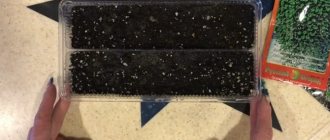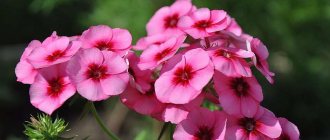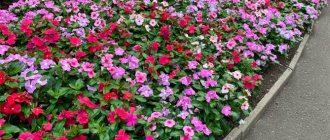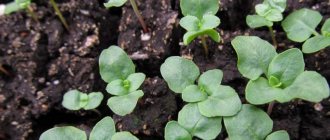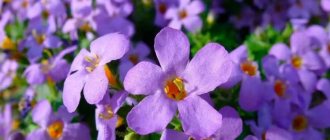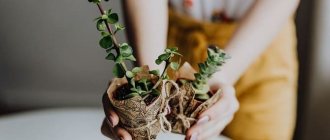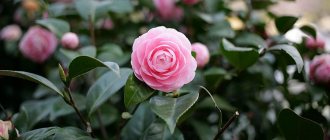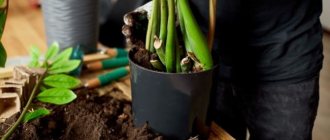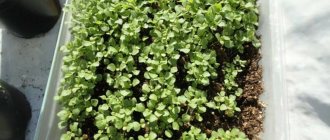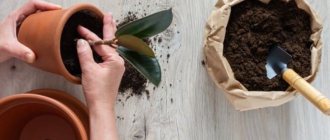Fluffy lobelia bushes from afar resemble bright clouds or soft carpets woven from thousands of miniature stars in blue, pink, purple or white. Due to their high decorative value and long flowering, which lasts from June until frost, they are very often used in landscape design, and are also located on window sills, balconies and verandas to decorate the exteriors of houses. In nature, this South African plant can develop in one place for many years, but the cold climate of the middle zone is far from the usual subtropics. That is why every autumn many flower growers wonder whether it is possible to preserve lobelia until spring, so that after warming it will again continue to delight others with its delicate petals. Read on to learn how to properly care for these flowers in winter.
What varieties of lobelia are grown from seeds?
Thanks to the work of breeders, many varieties have been developed that can be easily grown from seeds at home. The most popular varieties are:
- Riviera White;
- White Lady;
- White Palace;
- Lilac Regatta;
- Regatta Rose;
- Reviera Rose;
- Blue fountain;
- Emperor Willy and others.
The varieties differ from each other in the color of their long-blooming flowers. They look great in flower beds and pots and bloom until late autumn.
Methods for sowing small lobelia seeds step by step with photos and videos
Let us immediately note that you should not worry about the fact that you will need to distribute small flower seeds over the surface of the soil at a certain distance from each other. Seedlings can grow in heaps, since they plant lobelia not one sprout per glass, but in bunches. This makes it easier to grow lobelia from seeds at home. However, it is not recommended to sow too thickly. Therefore, we offer planting options that will help you get friendly and not very dense shoots.
Attention! Lobelia seedlings can be planted in a common container followed by picking or in separate cups. In the latter case, there is no need to pick the plants.
Sowing in the snow
A very quick way to plant tiny lobelia seeds is to sow them in the snow. You only need to prepare a container, soil for seedlings and snow. The soil does not need to be pre-moistened. The snow is spread over it in an even layer and compacted a little.
The seed can be sprinkled on the snow, rubbing it between your fingers, or you can “dip” your finger into the seeds first and then run it across the snow. Dark seeds are clearly visible on white snow. If it seems to you that they are lying somewhere thickly, you can correct the situation with the help of a toothpick.
Watch a video that shows how easy it is to sow lobelia seeds in the snow.
Sowing with sand
When planting in the spring, in many regions there is no longer snow, so sand can be used to sow lobelia seeds for seedlings. We’ll tell you step by step how much sand you need for this sand and how to sow small seeds with it correctly with photos:
- Prepare containers with drainage holes.
- Pre-moisten the soil for seedlings. If you bought it in a store and just opened the package, then the soil in it is quite moist.
- Pour soil into a container or glass so that there is 2-3 cm left to the edge.
- Pre-heat the dry sand in the microwave, cool and mix thoroughly with the seeds. You need to take about two tablespoons of fine sand per bag of planting material.
- Spread the mixture evenly over the surface of the soil.
- Using a spray bottle, carefully spray the plantings with lukewarm water.
- Cover the container with a lid or cling film and place in a warm place.
It is important! After sowing, there is no need to sprinkle lobelia seeds on top with soil or sand, no matter how you sow them.
Before emergence, plantings should be in a warm place. The containers can be placed on a warm floor or radiator. But be sure to cover the heating radiator with a folded towel, otherwise the seeds in the soil will simply “cook”.
You will be interested to know: Growing balsam from seeds at home: when and how to plant seedlings, photo
If there is no sand or snow, no problem. Simply, rubbing the seeds between your fingers, try to sow them evenly over the surface of the moist soil. After this, also spray, cover and put in a warm place.
Another way to plant lobelia seedlings without sand, but it’s very simple, watch the video clip.
Planting in peat tablets
It is very convenient to sow and grow lobelia seedlings without picking in peat tablets. It grows in them before planting in the ground or flower pots. There is nothing complicated about sowing small seeds into peat tablets:
- Place the tablets in a deep container and pour warm water into it.
- After about 20-30 minutes, the peat will be completely wet, and it will be possible to begin planting work.
- To do this, you just need to dip your finger in the lobelia seeds, and then smear them, that is, sow them on top of the peat tablet.
- Cover the container with a lid or film and place in a warm place.
Attention! Before emergence, check the moisture of the soil, especially peat tablets, every day. It is also necessary to remove the cover to ventilate the soil and check whether seedlings have appeared.
Watch a video about sowing pelleted lobelia seeds in peat tablets.
Photo of lobelia flower
When to plant lobelia seedlings, in what month
At home, in order to get strong and healthy seedlings, you need to start sowing seeds in early February. This is the most optimal time to sow, because the seedlings will develop correctly, and the lobelia will bloom at the right time.
If you want to enjoy magnificent flowering earlier than usual, then sowing is moved to January.
In this case, you need to be prepared for the fact that you will have to devote more time to the seedlings than usual. They will have to be additionally illuminated and ensure that they do not stretch out. Bushes grown in this way and experiencing a lack of light will not be lush and will lose their charm.
Wintering in a city apartment
It is important not to miss when the seeds ripen and to pick up the dried boxes in time, otherwise all the seeds will end up on the ground and it will be impossible to find them. But you can go another way.
Since lobelia is a perennial plant, I grow it in the summer in the garden, in a flower garden, and in winter I transplant it into a pot and continue to grow it on the windowsill. In the fall, before frost sets in, I dig up the most beautiful compact bush with a lump of earth and transplant it into a wide container. If you are late with replanting and allow the plant to get even a light frost, all the flowers will die. True, the leaves, young shoots and buds will remain alive, and within two weeks the bush will bloom again.
The dug up plant quickly takes root in the bowl. Flowering continues throughout October, November and even longer if faded flowers are regularly removed. After this, the lobelia rests for about two months. At this time, you need to put it in the brightest and coolest place and reduce - almost stop - watering. In February, new tiny shoots will begin to grow from the base of the bush. At this time, I pour fertile soil into the bowl and direct the growth of the stems to the sides. Soon the bush becomes curly and fluffy. In the sun, the shoots darken - “sunbathe”. Tiny roots form at the bottom of each shoot. This means it’s time to plant these shoots in separate containers, where they will begin an independent life. As soon as they reach a length of 4–5 cm, I pinch them so that they begin to bush. From one overwintered bush it is possible to obtain more than a dozen new plants using this method. Sometimes, instead of pinching, I simply lay the shoots in a circle and pin them to the ground, adding new soil. Soon they begin to produce additional roots in the internodes, and then new shoots, turning into independent fluffy bushes.
Planting lobelia for seedlings depending on the region
Despite the fact that there are generally accepted times when it is recommended to sow lobelia seeds at home, it is very important to take into account the climatic characteristics of each planting region.
- In the southern regions, you can sow seeds already at the end of February.
- For the regions of central Russia, there is no need to rush to plant; it is better to sow in early spring.
- In the northern regions, the Urals and Siberia, seeds are sown in January and February. Since summer does not last long there, it is very important not to be late with planting in order to have time to admire the beautiful flowers.
Reproduction of lobelia perennial
In order not to buy lobelia seeds every year, you can stock up on them in the fall if you planted a perennial plant. To do this, shake off the seeds from faded flowers over a sheet of paper. You can store them in a paper bag until mid-winter, when it’s time to plant seedlings.
There is a vegetative method for plant propagation. To do this, they dig up and separate the cuttings and transplant them to another place. They are also transplanted into loose soil, watering very often, for better rooting.
When to plant lobelia seedlings in 2022 according to the lunar calendar
Experienced flower growers, in addition to the generally accepted dates for sowing lobelia, also take into account lunar cycles. Following the recommendations of astrologers helps to obtain magnificently blooming, bright bushes of an unpretentious plant.
Favorable days for planting lobelia in 2022 according to the lunar calendar
Among all the dates, astrologers have identified the following numbers as favorable for planting lobelia
| Month | When is the best time to sow |
| January | from 5 to 7, 11, 15 and 17 |
| February | from 2 to 5, 10 and 12, from 13 to 15 |
| March | 3, from 7 to 9, 11, 14 and 15 |
| April | 6, 7, 10 to 12, 15 and 17 |
| May | 4, 7, 8 to 10, 13, 15 |
INTERESTING! Please note that the favorable days for sowing in 2022 were the first and second ten days of each month.
When is it not worth planting lobelia seedlings in 2022 according to the lunar calendar?
Among the dates when it is better not to plant lobelia, learned astrologers have identified the following dates.
| Month | When not to sow |
| January | 2, 18, 20, 22 and 25, 27, 30 |
| February | 1, 16, 21, 23 and 24, 26, 28 |
| March | 2, 18, 20, from 22 to 24, 27 and 30 |
| April | 1, 16, 22, 25, 26 to 29 |
| May | 16, 21, 23, 25 to 27, 30 and 31 |
On unfavorable days, you should suspend all work related to growing lobelia at home.
How to determine sowing time?
The plant does well outdoors, but only in warm weather. There should be no frost after planting, as the stems and roots will quickly die. Therefore, the choice of when to sow lobelia depends on the time of year of cultivation.
It is recommended to sow lobeli for growing seedlings at the end of February. You can choose any time throughout March. Some gardeners plant in December and January. But this should not be done due to the lack of a large amount of sunlight. If you sow the seeds at the recommended time, the emerging stems will be more viable, but if the planting was done when daylight is short, then it is necessary to supplement the seedlings with light.
What you need to plant lobelia seedlings
Caring for lobelia while growing at home is quite simple, but getting strong, healthy seedlings will require a little time, patience and attention.
How to choose the right variety?
The choice of variety largely depends on the wishes of the grower. The choice of seeds for growing at home is huge, and each variety has its own characteristics in planting and caring for itself. Referring to the care requirements and their capabilities, preference is given to one or another variety.
How to choose seeds for planting lobelia
The highest germination rate is achieved by seeds from this or last year.
If last year's seeds are selected, you need to pay attention to their appearance and general condition. They must be dry, without visible damage and without mold. This year's seeds should also look healthy.
What soil is needed for planting lobelia?
For sowing seeds, it is recommended to choose a light, loose soil substrate with high moisture and air permeability. The acidity level should be neutral.
You can buy suitable soil in specialized stores or prepare it yourself.
For preparation, take 2 parts of earth, 2 parts of humus, 1 part of peat and 1 part of coarse river sand. Dolomite flour or wood ash can be added to the mixture of these components to neutralize acidity
ATTENTION! Before sowing, it is recommended to disinfect the substrate prepared independently! To do this, place the container with soil in an oven with a temperature of +90°C for 20-30 minutes.
How to prepare seeds for sowing seedlings
Since lobelia seeds are very small, they are mixed with sand before sowing. If this is not done, the seedlings will be dense, which will lead to a decrease in the decorative value of the adult flower.
Flower shops sell granulated seeds; in this case, there is no need to mix them with sand for sowing.
What not to do when planting lobelia
To be sure that the seeds will germinate well, the soil should not be over-moistened. This is the basic and main rule that must be followed when growing at home.
Typical diseases and pests
Viruses
The appearance of a purple tint to the leaves and uneven spots indicates infection of the crop. The disease is often confused with sunburn.
After a few days, areas of the plant will begin to deform and dry out. The stems will turn black. The plant will stop growing. It will not be possible to save the flower.
It is necessary to destroy the infected lobelia. To avoid infection, you need to regularly inspect the flower and destroy the main carrier of the virus - thrips.
Stopping the development of lobelia. Premature wilting of all inflorescences.
Bacterial disease
After a long stay in the sun, the leaves of the seedlings sharply change color to a matte shade. The shoots may acquire a brown tint.
Bacteria infect the entire plant. High temperatures and dry air contribute to the spread of the disease. The flower is affected due to the use of contaminated tools during pruning or propagation.
The pathogen Xanthomonas campestris can enter the plant through contaminated substrate or poor-quality water.
Treatment with benzoic acid will only harm the crop. An infected plant is not recommended for cuttings. Changing the container and soil will not help.
Shoot rot
Some parts of the stems become gray in color. Subsequently, mold appears. The shoots wither. Inaction can lead to infection of the entire flower.
The plant can be cured with Fengesamide or Iprodione. Damage can be prevented by increasing the level of air humidity. It is advisable to reduce feeding of lobelia with nitrogen fertilizers.
Thrips
The appearance of light marks on the foliage is evidence of the presence of dangerous insects. Pests suck out the sap of the plant. The inflorescences fall off prematurely.
Leaves and branches may become deformed and dry out. Thrips can damage the plant and also infect lobelia with dangerous diseases.
Methiocarb and Spinosad should be used to control pests.
Planting lobelia seedlings at home, step-by-step photos
Experienced gardeners use several successful methods for planting lobelia seeds.
With sand
Planted according to the following scheme:
- a small amount of seeds is mixed with dry sand;
- moisten the soil and sprinkle the resulting mixture on it;
- scattered seeds remain on the soil surface.
In the snow
Sow as follows:
a thin layer of snow is placed on the top layer of soil;
Seeds are sown on top of the snow.
The snow melts and gradually sinks the seeds to a shallow depth into the ground.
Peat tablets
Peat tablets are often used when planting vegetable or flower seeds:
- the tablet is soaked;
- Seeds mixed with sand are planted on top.
IMPORTANT! When using any sowing method, the container with seeds is covered with glass on top to create a greenhouse effect.
How to care for lobelia seedlings
Caring for crops will not be difficult even for beginners in this matter. If certain rules are followed, the risk of seedling death is reduced.
Care immediately after sowing until lobelia shoots emerge
Immediately after sowing, the container is tightly closed with glass or any other transparent material.
The soil must be moderately moistened periodically. The container is placed in a bright, warm place, with an air temperature from +20°C to +23°C.
In order to prevent fungal diseases from developing, the accumulated condensation on the upper cover must be removed. The container is ventilated daily for 15-20 minutes.
Caring for lobelia after the appearance of entrances
After the emergence of seedlings, watering is carried out using a spray bottle with settled water at room temperature.
The container is positioned so that there is enough lighting, but direct sunlight does not fall on the seedlings.
The air temperature in the room should not rise above +25°C and fall below +20°C.
BY THE WAY! If these simple requirements are met, the first shoots will appear 7-8 days after sowing the seeds.
How to care for lobelia seedlings
Young shoots are very tender and at risk; during this period, care should be very careful and careful.
Watering
To avoid damaging the tender lobelia sprouts, it is recommended to water with a spray bottle. It is important to ensure that the water is not too cold or too hot.
The frequency of watering depends on the condition of the substrate. Its surface should not dry out, but waterlogging also negatively affects the condition of the root system.
Top dressing
You can feed 2 weeks after the first shoots appear. As fertilizers, you can use water-soluble complex or mineral fertilizers, which can be bought in specialized stores.
Planting lobelia in open ground
Despite the fact that growing lobelia in open ground using seeds is more difficult than growing and planting seedlings, some gardeners choose this method.
Which varieties of lobelia are suitable for planting in open ground?
Almost all varieties can be sown directly into a flowerbed. Bush varieties look great in flower beds: Blue Flash, Emperor Willie and others.
Ampelous varieties are good for growing in hanging pots. These include: Niagara, Sapphire, a series of Cascade varieties, etc.
When can you plant lobelia in open ground?
It is recommended to sow lobelia seeds directly into the flowerbed from March to April. Flowers planted in this way bloom a little later, but are highly adaptable to changes in weather conditions and highly decorative, as they form bushes in their natural environment.
How to plant lobelia in open ground?
Lobelia is sown immediately on the prepared area in two ways: sowing seeds and planting seedlings. Both growing methods have their own nuances and positive aspects.
When and how to pinch lobelia for abundant flowering
It is recommended to pinch lobelia for more luxuriant growth and flowering. This must be done correctly for the procedure to have the desired effect. According to all the rules, at the age of 5-6 true leaves, plants are pinched at the top point of growth. More precisely, they don’t even pinch, but tear off or cut off a small part.
It is better to do this in the early morning or evening when the sun is not shining. Some time after the procedure, you may notice that the bushes grow mainly in width.
As a rule, hanging varieties do not require pinching. The rest, if you neglect this, will actively rise up, without dense foliage and with a meager number of flowers.
This should be done about once a month after the first time.
Planting lobelia seedlings in open ground
As soon as the spring sun has warmed the ground and the lobelia has grown, it can be planted on the site. To preserve all the advantages of a magnificently flowering bush, you need to follow some rules.
How to choose a place to plant lobelia
You can use any area for planting; the plant does not have any special requirements for this and grows and blooms well, both in sunny areas and in the shade.
Where can you plant lobelia next to?
In landscape design, lobelia harmonizes perfectly next to marigolds, salvia, chamomile and petunia. Some varieties also look beautiful in single plantings.
How to prepare lobelia seedlings for planting in open ground?
Transplanting to a site is a painful undertaking. To quickly adapt, young plants need to be prepared.
With the onset of warm sunny days, the cups with them begin to be taken out into the fresh air for hardening. In the first days they are outside for 10-15 minutes, later their stay in the air increases to 10-12 hours. After this, you can already transplant from home to the garden.
How to prepare a place for planting lobelia outdoors
The area where it is planned to grow beautifully blooming lobelia is carefully prepared. Weeds are removed, the ground is dug up and, if necessary, fertilized.
ATTENTION! You should not get carried away with fertilizer; foliage will actively develop on fertile soil, and lobelia will bloom much worse.
How to plant flowers correctly, step by step
Flowers are planted according to the following scheme:
- small depressions are made in the ground at a distance of 20-25 cm from each other, slightly larger than the volume of the cup in which the planting material is located;
- together with a lump of earth, young sprouts are planted in prepared holes;
- the soil is well compacted and watered.
If the site is located in an open area, then the planted planting material must be shaded with tree branches or any other material.
Interesting Facts
Interesting facts that a novice gardener may not know:
- caring for an annual or perennial plant is similar;
- if perennial varieties are selected, dry inflorescences are removed every year in the fall so that the next flowering will be abundant;
- the bushes are pruned into a ball shape;
- if the local climate is warm, wintering is also possible in flower beds; in the northern regions it is recommended to grow the plant in large containers, changing their location depending on the ambient temperature;
- Lobelia is used in landscape design, grown in hanging baskets, decorative flowerpots, and flower towers.
When flowering occurs, large balls of bushes are formed that resemble clouds.
Caring for lobelia after planting in open ground
Further care is practically no different from other flowering crops and involves moderate and timely watering, fertilizing and weeding.
Water as needed so as to prevent the soil from drying out.
Vermicompost is considered the best fertilizer for abundant flowering. It contains all the necessary microelements and contains a minimal amount of nitrogen.
Loosening and weeding are carried out depending on how contaminated and compacted the soil is. Loosening is carried out to a depth of 5-8 cm.
Reasons for the absence of inflorescences
Abundant flowering can be ensured only by observing all agrotechnical growing conditions.
After flowering, seed pods form on the lobelia.
There are several rules for successfully stimulating the formation of buds:
- A brightly lit landing site.
- Air-permeable and drained soil.
- Water as needed.
- Pruning dry and damaged stems. After flowering, bare shoots must be removed.
- Periodic pinching.
- A sufficient amount of fertilizing without nitrogen components.
Large inflorescences on low-growing bushes are formed on lobelias grown from English seeds. It is advisable to plant terry lobelia in the ground directly in a shipping container. In the fall, you can remove the pot from the ground and move it indoors.
Answers to frequently asked questions
What is the best substrate to sow seeds in?
Preference should be given to the one sold in specialized stores, since all the vitamins and microelements in it are balanced.
Seeds do not germinate, what should I do?
There may be several reasons for this: the seeds are old or affected by diseases, lack of sunlight, improper care. To solve this problem, the growing conditions should be reconsidered; this is most likely the reason.

